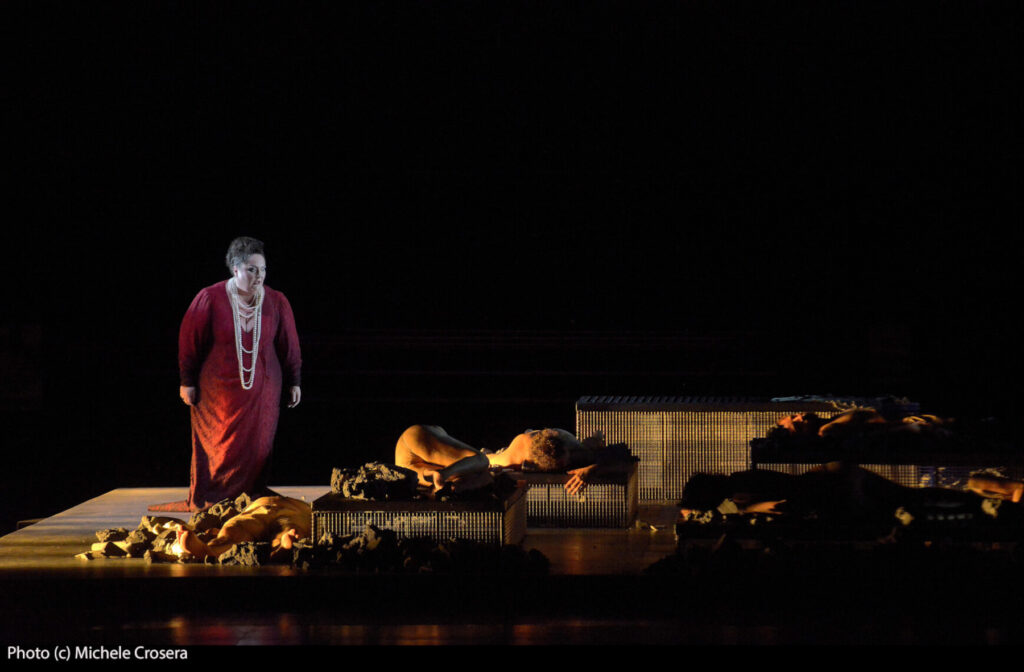By happy coincidence 2024 is an anniversary year for both Arnold Schoenberg (born 1874) and his son-in-law Luigi Nono (born 1924). Judging from the lack of works by either composer in concert and opera schedules this year, programmers evidently feel that they still scare off audiences. It’s enterprising and fitting, then, that a double bill of one Act operas by the two composers are programmed together, especially at La Fenice, in the city where Nono was born and died. If these short works, each for a single singer, don’t offer the more expansive musico-dramatic canvases as, for example, Moses und Aron or Intolleranza 1960, they are no less progressive for that, nor do they present a more facile or easy-going experience in the opera house today.
Nono’s nightmarish vision of the dehumanising, noisy environment of a modern industrial factory serves as the prelude to Schoenberg’s equally nightmarish, but existential psychodrama about love, jealousy and death. Daniele Abbado’s production draws our attention to the comparisons (and contrasts) to be made between the two, with the same, stripped back setting for both which is effectively and deliberately not a staging (as Nono, at least, essentially envisaged, seeking an anti-mimetic and non-naturalistic form of music drama). Within the empty stage, just a few pallets remain for Erwartung, as they were left at the end of La fabbrica illuminata, strewn with the debris that had been dropped upon them from a huge, suspended sail at the apparently hopeful climax of the latter.
Abbado says that the debris is meant to accumulate in the sail as a marker of the passage of time. But in a staging where there is so little other choreographic or visual incident, it seems an event which is more apocalyptic and loaded with meaning for the future. And indeed, the same handful of semi-naked actors also remain for Erwartung, spread on the floor and expired as though they are themselves the tragic human debris left behind by Nono’s ravaging factory. In the otherwise dark, empty set, they stand in for the sinister forest of tree trunks in which the Woman wanders, searching for her lover, and mistaking one of them as his dead body before she stumbles upon his actual corpse. Death, estrangement and loneliness seem to be all that are left once the more tangible environment of the factory has been dispelled. It is all the more telling in Nono’s work – which the composer intended not to be a naturalistic representation – that some images are projected during La fabbrica illuminata, made from the same factory at Cornigliano where the sounds were also recorded onto tape, which form the basis for the accompaniment to the singer.

In the fabulously gilded and ornamented auditorium of La Fenice, Nono’s assemblage of strident, metallic noises makes an arresting, if even disorienting, effect, especially when amplified as powerfully as here. Against that, the aphoristic libretto is calmly sung by Sarah Maria Sun, as though a disembodied reflection upon the status of the factory for mankind’s social and spiritual wellbeing rather than a visceral confrontation with it in real time. Her disassociation is also rendered physically as she interacts little with the extras on stage, who hover somewhat like zombies churned out by the factory which no longer seems to have use for them.
In accordance with Abbado’s avoidance of any typically psychoanalytical interpretation of Erwartung, Heidi Melton’s performance is similarly composed and ruminative, often expressing a lyrical warmth instead of the tension and anxiety of ‘expectation’ implied by the title. The reading of the score by Jérémie Rhorer and the Orchestra of La Fenice is lucid: despite the sizeable ensemble which Schoenberg calls for, it cultivates quite a subtle backdrop of shadowy rustles and murmurs, often sounding as though it had more of the dimensions and immediacy of one of the composer’s Chamber Symphonies. Although the music doesn’t recreate the literal sounds of the wood, this performance results in something of a detailed sonic ambience in a similar way as Nono’s montage for his work. The two short dramas may have been composed more than half a century apart and embody different musical and theatrical aesthetics, but here they are unified successfully within the ambit of a single, haunting dramaturgical idea.
Curtis Rogers
La fabbrica illuminata
Composer: Luigi Nono
Libretto: Giuliano Scabia and Cesare Pavese
Soprano – Sarah Maria Sun
Erwartung
Composer: Arnold Schoenberg
Libretto: Marie Pappenheim
A woman – Heidi Melton
Director – Daniele Abbado; Set and Lighting Designer – Angelo Linzalata; Costumes – Giada Masi; Choreographer – Riccardo Micheletti; Sound Director – Alvise Vidolin; Video Designer – Luca Scarsella (Milan) Studio Vertov; Conductor – Jérémie Rhorer; La Fenice Orchestra
La Fenice, Venice, Italy, 17 September 2024
All photos by Michele Crosera/La Fenice.